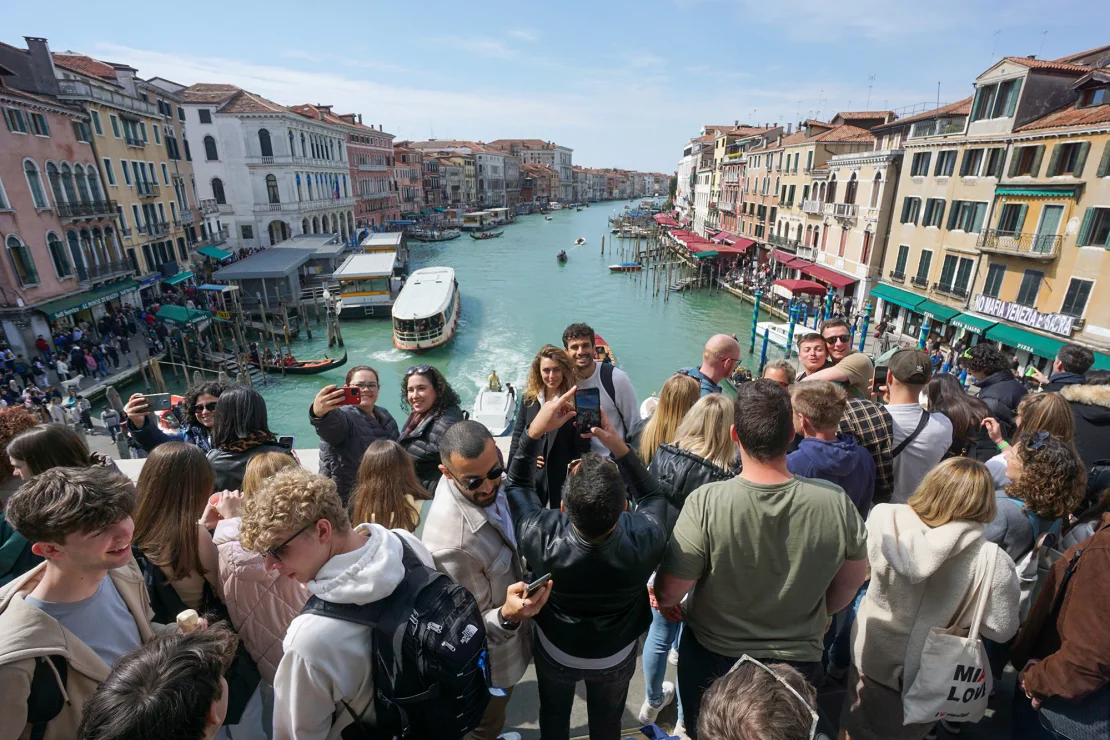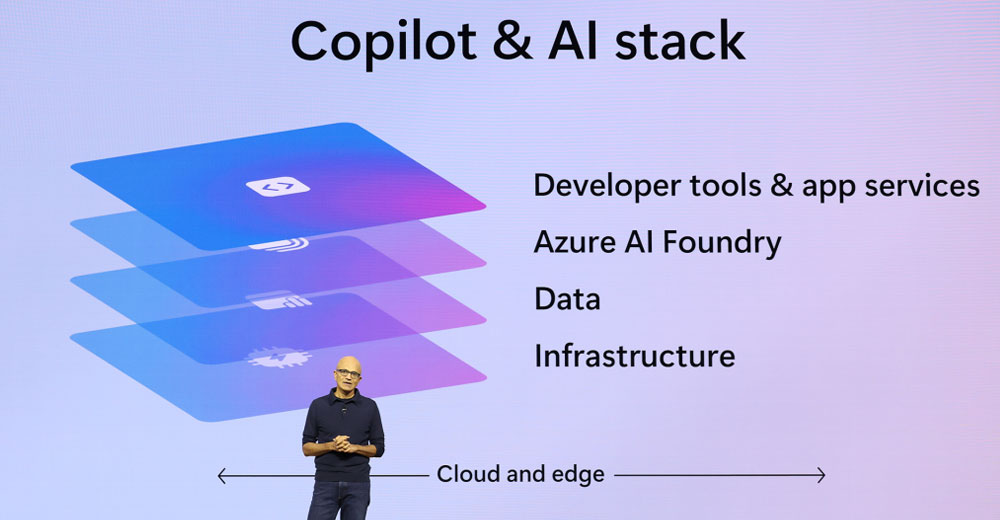
Within two blocks of setting out from Venice’s Rialto Bridge in search of pickpockets, Monica Poli has identified what she believes are three of them.
“Attenzione, pickpocket!” she yells loud enough to be heard a block away. “Attenzione — ladri, carteristas!” (She makes her announcements in Italian, English and Spanish to alert as many tourists as possible.)
People stop and stare. One woman says, in English, “Thank you,” and brings her family over for a photo. A French tourist approaches Poli to thank her for everything she does. Alessandro Lavardato, like 605,000 others, follows Poli on Instagram. “I thank her for the work she does and the help she gives tourists,” he says. “These pickpockets are a real problem.”
Forget artists Titian or Tintoretto — for many people today, the person most readily associated with Venice is Poli, a 58-year-old Venetian who spends much of her spare time patrolling the streets of the canal city in search of pickpockets.
Since she posted her first video on social media in June 2023, her videos have accrued millions of views across multiple platforms. That first video scored 69 million on TikTok alone, she says (though she’s no longer on the platform).
Her phenomenally powerful voice and trademark phrase — “attenzione pickpocket, attenzione borseggiatori” — has been sampled in dance anthems, placed over footage of basketball players swiping the ball from under their competitors’ noses and even protesters marching against Florida governor Ron DeSantis.
But it’s by seeing her at work in Venice that you really calibrate her impact.
After she’s dispatched a suspect into the alleyways by shouting until they beat a hasty retreat, people applaud. “Brava Monica” (“Well done Monica”) shouts one bystander. The suspect was casually walking past H&M, not thieving, but Poli says she recognized him. There are around 100 male pickpockets regularly working in Venice alone, she says — and the task for her and her fellow volunteers is to learn their faces.
Even walking into shops and bars, Poli is accosted by people who recognize her and appreciate what she’s doing. Walking around the city with her is like being in the presence of royalty. Venice’s past rulers in its republican heyday, the doges, were always male. But today, Poli is the city’s unofficial dogaressa.
For all their fun, Poli’s videos — currently she has 461 up on Instagram — have spotlit a spiraling problem of petty crime in Italy.
According to a September 2024 report from the Italian Interior Ministry, reported by website L’Eurispes, data from 2023 and early 2024 suggests that thefts on public transport over the past decade have seen constant growth since 2021, with 2023 seeing the highest numbers of thefts in the past 10 years.
Thefts on trains across the country were up 21% — but thefts on trains in Venice were up by a whopping 38.8%.
The overwhelming majority of victims were foreign: 78% of bus thefts, 81% of train thefts and an astonishing 94% of those robbed on the metro.
Only last month, local paper Il Gazzettino wrote that Venice “seems to have become [pickpockets’] preferred place of work… a gold mine” thanks to crowded streets that allow thieves to legitimately rub up against their unsuspecting — and usually foreign — targets.
Perhaps vacationers tend to be less alert; perhaps Italians are more aware of the issue. But for Poli, there’s another crucial reason foreigners are targeted.
A December 2022 law, known as the riforma Cartabia (Cartabia reform), changed how petty crimes are handled by the Italian justice system.
It means that in order to arrest a pickpocket, police require the victim to make a formal report. What’s more, if the victim doesn’t turn up at the subsequent trial, the charge is automatically wiped.
“The Cartabia reform was implemented to streamline Italy’s judicial process and reduce case backlogs,” says Vincenzo Senatore, senior partner at Giambrone Law. “However, it has faced criticism for potentially enabling pickpockets to evade prosecution. Under this reform, if a theft victim does not file an official report, the perpetrator may avoid legal consequences.”

Italy’s Interior Ministry did not reply to a request for comment.
Because of this loophole, tourists are the easiest targets, says Poli — because even if they catch the thieves in the act and make a report, by the time the case comes to trial, they’ll likely be back home.
And that means that Venice, whose estimated 30 million annual visitors dwarf the under-50,000 local population, has become a honeypot for petty crime.
According to figures from the Gazzettino, in 2019, the last “normal” (prepandemic) year before the law was introduced, 82 pickpockets were arrested in Venice. As of November, 2024 had seen just two arrests. The rising statistics have seen Venice leap into the top 10 Italian cities for “criminality” according to Il Sole 24 Ore.
Senatore “agrees” with Poli’s theory. “The Cartabia reform has raised concerns, especially in tourist-heavy areas like Venice, where pickpocketing is prevalent,” he says, adding that volunteer groups like Poli’s Cittadini Non Distratti (“Undistracted Citizens”) are taking “proactive measures to protect visitors.”
An unlikely ‘Batman’

Poli makes an unlikely “Batman” figure. A born-and-raised Venetian, who worked in a clothes store in London before returning to her beloved city, she lives in the historic center of Venice with her family, and works in a blue-collar job (which she doesn’t want published for security reasons).
She seems almost offended at the suggestion that tracking pickpockets is her hobby. “I have other hobbies,” she says. “This is my … mission.”
It’s a mission conceived in the 1990s, when she worked in a clothes store in Venice popular with Japanese visitors. “It was when pickpocketing first started — people knew Asian travelers carried lots of cash,” she says.
“They would come to pay, and find themselves without their wallet. I can’t even describe [their reaction] — it was like something impossible had happened,” she says.
She joined Cittadini Non Distratti — a volunteer group founded in the 1990s. For three decades, the members — who now number around 50, with a wider network of eagle-eyed informers — have kept their eyes open for signs of malfeasance.
Members come from all walks of life. Some work in the tourist industry. One works for the public transport network, another in a kiosk selling souvenirs.
And then there’s Poli, who patrols the streets in her spare time. Even if she’s on the way back from the supermarket, she says, if she sees a pickpocket she drops her bags snd goes after them.
“I think I do it out of a sense of civic pride,” she says “I believe that if someone saw [a pickpocket] robbing my wallet they’d do the same.”
Poli isn’t just giving up her time. She’s also putting herself at risk. Since she started posting her videos, shifting the global spotlight onto Venice’s petty crime, she says she’s had her phone stolen and been physically attacked in March, pepper-sprayed in June, and spat on in November.
She has received numerous threats, she says, and has to take care where she walks.

“Me going into alleyways where there’s nobody else? Better not,” she says, sanguine.
Poli isn’t alone when it comes to reprisals. In the past year alone, according to local media one of the Cittadini Non Distratti founders, Franco Dei Rossi, has been punched in the face and hit with a mobile phone. A barista who intercepted thieves on his way to work in November ended up in hospital after being pepper-sprayed and punched in the face. Even a waterbus worker had a bottle thrown at his head in September when he caught two pickpockets mid-theft.
Poli says that members of the group have been threatened with knives, too.
“Sempre peggio,” she captioned a recent video in which a male suspect spat at her and made obscene gestures. “Getting ever worse.”
And yet she still goes out most days, warning victims in this, her watery Gotham City. “I go to work, and when I come out, I’m operational,” she says.
She breaks off our interview twice, once to chase down a pickpocket she says she knows of old, and once when she sees three men acting suspiciously in Piazza San Marco. As she walks through the streets, hat pulled low over her face, she is continuously scanning the people around her for suspicious behavior — anyone getting too close to someone, or subtly signaling to accomplices.
When we meet, Poli is downcast. Not because of the man who spat at her on camera two days earlier, but because, the day before, she witnessed pickpockets stealing from an elderly man, but couldn’t reach them in time.
The thieves’ habit of going after the most vulnerable upsets her. Several times, she mentions the precarious financial status of many pensioners in Italy, where nearly 10% of individuals live in “absolute poverty,” according to government figures.
A ‘criminal organization’

It’s not just pickpockets attacking Poli. Last year she went, in many eyes, from hero to zero when followers realized that she’s a city councilor for the Lega — a populist right-wing political party. Current leader Matteo Salvini (Italy’s deputy prime minister) has been scathing about the Roma community, and has defended Italian police’s policy of racial profiling as recently as October. He is currently on trial for blocking a boat of asylum seekers from docking in Italy in 2019.
But Poli says that her political beliefs are separate from her desire to stop petty theft in her city. And while some have said her videos are racist against the Roma community (although Poli herself has never commented on people’s nationality in her videos), she emphasizes that the subjects of her videos aren’t strangers. They are people she sees week in, week out, and — in some cases — has done so for decades.
Another member of Cittadini Non Distratti, Antonio Incandela, tells CNN separately that their movement is apolitical. He has no affiliations, he says; another volunteer is a member of the communist party.

Instead, Poli says this is about organized crime. “Pickpocketing is a multi-million euro business in all of Europe — it’s a criminal organization at mafia level,” she says, claiming that the volunteers have watched pickpockets start as kids and grow into the trade. Child protection is, she says, a major area of concern.
Europol, the European Union Agency for Law Enforcement Cooperation, says that “the scale and level of organization of pickpocketing [across Europe] suggests that mobile organized crime groups are heavily involved.”
A spokesperson for Europol told CNN: “There exist highly professional groups, very often family- or clan-based, that are very active in touristic areas such as Venice, Barcelona or Paris.”
Poli’s videos showing the faces of alleged pickpockets have also come in for criticism. She says that her TikTok accounts have been closed twice for causing distress to those shown, leading her to abandon the channel and start a YouTube instead. TikTok did not respond to repeated requests for comment from CNN.
“Some people defend the pickpockets’ privacy,” she says. “I say great — you can also take the responsibility of refunding the people who were robbed, the old, the disabled, tourists who are pickpocketed every day.”
She was lambasted last year for telling the The New York Times that she had a “sixth sense” for recognizing pickpockets, but says that it’s their behavior, not what they look like, that alerts her.
“There are behaviors that we observe, and as the days go by we evaluate. Sometimes they’re together with the ‘historic’ ones [pickpocket old-timers] so we realize it might be one of them,” she says.
“When we see ones who’ve been here for more than 10 years, if there’s a group of two or three of them, they could be going for a walk, though I have my doubts. We try to see, analyze what they’re doing [before alerting the public]. But 100% of the time we see that they are getting into action as they approach people.” That’s when she unleashes her famous “attenzione pickpocket” shriek.
If you’re heading to Italy soon, you may be wondering how to recognize a pickpocket. But Poli says that’s a waste of time — after all, they look just like you. The reason she spots them, she says, is because she sees the same faces every day.
Instead, Poli says, visitors should put all their focus on protecting their own possessions. Internal pockets in jackets and bags are essential, she says, suggesting you separate cash and cards in one internal pocket, and ID and driving licenses in another.
Never have anything behind you, whether in a pocket or in a bag.
“When you’re on a crowded pier you feel yourself pushed and in an instant they’ve taken your wallet,” she says. “Or you’re in a crowd. You don’t feel it — they even close the zip back up. Always keep your bag in front and keep your hand over it.”
She advises using a cord to attach cellphones to your bag or clothes.
And when buying a vaporetto (waterbus) ticket, be aware of who’s behind you. She says that often thieves work in pairs, with one watching visitors enter their PIN to buy the ticket, and the other on the pier, ready to swipe the card and “empty your account.”
“Everybody says, ‘They’ll never rob me,’ but it’s not true,” she says.
“When they stole my wallet, I went out of my mind. We have everything in our wallets — cards, money, photos of our families, important documents. Imagine for an old person who has photos of people who aren’t with us anymore. Maybe they have the only photo left in there.”
But follow her instructions, she says, and “you’ll enjoy your holiday in peace.”
Before we meet, Poli refuses to share her contact details. She insists on meeting in a public space in an area where police make regular patrols, and shows up with a male companion.
“I receive lots of threats, I was struck two weeks ago, [pickpockets] spit at me, shove me,” she says. “And yet I carry on because it’s not right. I will keep going as long as I can.”



